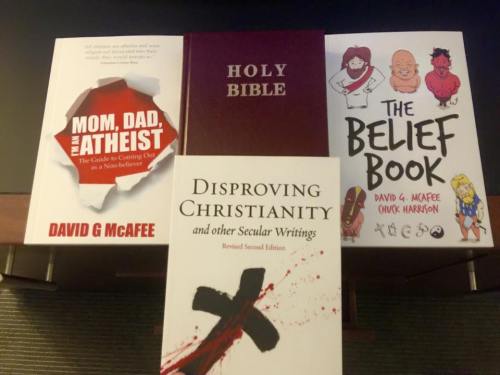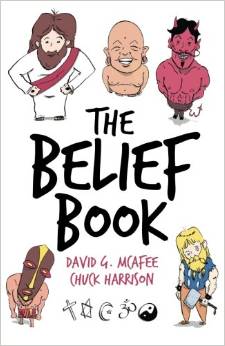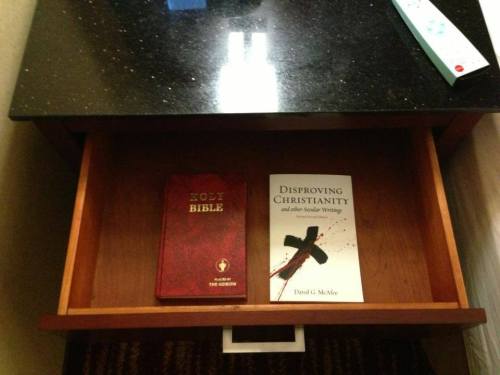I’m in an open (and loving) relationship
By David G. McAfee and Holly Samel
I belong to a minority group of people that many others think of as immoral or “sinful.” Members of this group often looked at scientific evidence, as opposed to cultural norms, to reach their current position. People in this group are also regularly forced to conceal or disguise their views for fear of judgment based solely on (undeserved) social stigmas. I’m not talking about being an atheist, childfree by choice, or even a feminist… I’m talking about the fact that I’m in a non-monogamous, “open,” relationship.
What does this mean?
An open relationship could mean just about anything, as it is interpreted by the participants, and non-monogamy refers to a whole host of lifestyles and relationship dynamics. For me, however, it’s pretty simple: I am socially monogamous and sexually open. I have a long-term partner to whom I am dedicated, but I’m not limited to one woman sexually. I don’t have multiple girlfriends and I’m not going to marry anyone – let alone have more than one wife.
This isn’t what every non-monogamous person does, but it’s what I’m doing now and I am happy. I take proper precautions to avoid sexually transmitted infections and pregnancies, all people involved are consenting adults who are made aware of the situation, and it has actually brought me closer to my partner. If we are happy, safe, and more honest in life, then nobody will care what we do, right? Wrong.
Reactions.
Publicly acknowledging my open relationship is still new to me–I haven’t really spoken to many people about it and I only changed my “relationship status” to reflect the change a little more than a week ago. Even after such a short time, however, I’ve already had some interesting responses. The first notable message was from someone who said he and his wife are themselves in an open relationship and that “being able to articulate this without stigma is often difficult.” I immediately thought of the similarities between the negative stereotypes associated with non-traditional relationships and those atheists face in many regions – and how I might be able to help.
The second jarring reaction I received after I mentioned non-monogamy as “natural” was from a Christian apologist with a podcast. In response to what he called an “endorsement of non-monogamous relationships,” the apologist said, “Add that to the list that includes things like abortion, infanticide, incest, etc.” He continued to compare non-monogamy, consensually sharing multiple sexual or romantic bonds, with bestiality, sex between humans and non-human animals.
In case that wasn’t bad enough, the third response I’ll mention really missed the mark. This comment came from a Facebook friend who saw my relationship status change and implied that I was seeking sexual favors online. He thought the fact that I was honest about the type of relationship that I have, and that my relationship isn’t similar to his traditional paradigm, meant that I was soliciting my fans for sex. He even compared my status change, which was for the sake of transparency and is only visible to my friends, with Richard Carrier’s recent blog post. In that entry, Carrier, an atheist author who is polyamorous, asks his fans if they want to go on a pre-planned date with him.
Needless to say, I was confused by the onslaught of assumptions and accusations. I have never lied to my partner about my feelings and I’ve never acted unethically by treating my fan page like a dating website, so it’s difficult for me to see these as anything more than uninformed attacks. In fact, in my mind, I’m not doing or saying anything that crazy. I’m simply acknowledging what scientists have known for a long time: human beings don’t naturally mate for life.
What does science say?
Richard A. Friedman, a professor of clinical psychiatry at Weill Cornell Medical College, recently pointed out that infidelity “lurks in your genes.” He noted that, while for some people one partner is perfectly fine, for others “sexual monogamy is an uphill battle against their own biology.”
“Sexual monogamy is distinctly unusual in nature: Humans are among the 3 to 5 percent of mammalian species that practice monogamy, along with the swift fox and beaver — but even in these species, infidelity has been commonly observed,” Professor Friedman wrote in a piece for the New York Times.
Noted relationship advice columnist Dan Savage has a similar view, also rooted in scientific understandings of human biology. He told astrophysicist Neil deGrasse Tyson in a recent interview that, “we are not naturally monogamous; it is a difficult struggle for us.”
“No primates with testicles our size are monogamous, sexually monogamous,” Savage said. “The truth is if you make a monogamous commitment to someone you love, you will still want to have sex with other people. You will refrain from it. It will be difficult.”
Savage went on to reference sex writer Chris Ryan in saying that, in many cultures, adultery is met with the death penalty. We can’t say monogamy comes naturally to us as a species if we have to kill to enforce the rule, he argued.
“Well, no other species has to be threatened with death to do that which comes naturally to it,” Savage told Tyson during the interview. “We don’t point guns at dolphins and say swim. Right? But we point guns at each other and say don’t cheat.”
Forget what you’ve been told.
A lot of people are more comfortable sweeping subjects like this under the rug. They think that, because we have always been told things are one way, that there are no other options. But studying other regions of the world will tell you that many things are cultural and not so black and white. In many cases, we are governed not by facts but by social lies: rules, codes of conduct, or ideas that guide how we behave but are based on self-deception.
For example, do you think the color pink is really a feminine color? Do you agree that other cultures might find it masculine or even gender neutral? The fact is that we are told pink is a “girl” color and that blue is for boys, but those perceptions come from marketing – not reality. It is now a powerful connection in our minds, but that doesn’t make it an objective truth.
“Cheating” is another social lie – this one formed as a result of our jealous nature. We are told our loved ones are our property, that we shouldn’t share them with anyone else, and that cheaters deserve the worst possible punishments. These ideas are reinforced by movies, television, and other media, and are attached to religious views and marriage vows. These pre-conceived notions of what it means to cheat have even caused millions of divorces and even murders. But I don’t “cheat” on my partner because I don’t think we have to use society’s definition. I think cheating should be defined by the participants of any specific relationship and be based on desires and comfort levels.
Savage argues that social lies that surround cheating exist because we are given unrealistic relationship standards from day one.
“What we said, what we believed, what we’re told as children, is one day you’ll grow up and fall in love with someone and you’ll make a monogamous commitment to them, and that means you’re in love with them,” Savage said. “And when you’re in love, you won’t want to have sex with other people.”
But we know that, for many people, this just isn’t true. For them, no matter who they are with, sexual monogamy will always be a problem. Because humans are among a number pair-bonding animals that often have sex outside of their partnership, Savage and others often refer to us as a “monogamish” species.
Why speak out?
Non-monogamy is extremely common among humans and throughout the animal kingdom, but that doesn’t stop people from treating it like a perversion. In fact, according to a 2013 Gallup poll, 91 percent of Americans find marital infidelity “morally wrong.” That is higher than the percentage of people who opposed polygamy, human cloning, and suicide, according to the poll.
Savage says the negative stereotypes are reinforced by the fact that we only hear about the bad non-monogamous relationships and not the good ones.
“If a three-way or an affair was a factor in a divorce or breakup, we hear all about it,” Savage wrote. “But we rarely hear from happy couples who aren’t monogamous, because they don’t want to be perceived as dangerous sex maniacs who are destined to divorce.”
With all the negativity surrounding non-monogamy, despite the fact that it is such a natural and recurring concept throughout history, many people have decided to hide their true colors to satisfy the moral majority. But that doesn’t really solve anything for anyone else in that position. It won’t make it easier for them to talk about the issue because the social stigma remains strong. When asked why it’s important to speak out about this topic, I can’t help but think back to a quote from Mom, Dad, I’m an Atheist:
“By telling people you don’t believe, you’re making it a bit easier for the next person who has to. You are making it that much easier for the next generation and helping to change the (very false) perception of atheism as something that is anti-god or even pro-evil. More than anything else, coming out as an atheist gives you the opportunity to educate believers — to show them that it is entirely possible to be morally good without believing that we are being policed by an all-knowing deity.”
I think similar reasoning can be applied to this subject.

I cheated and this is my punishment.







